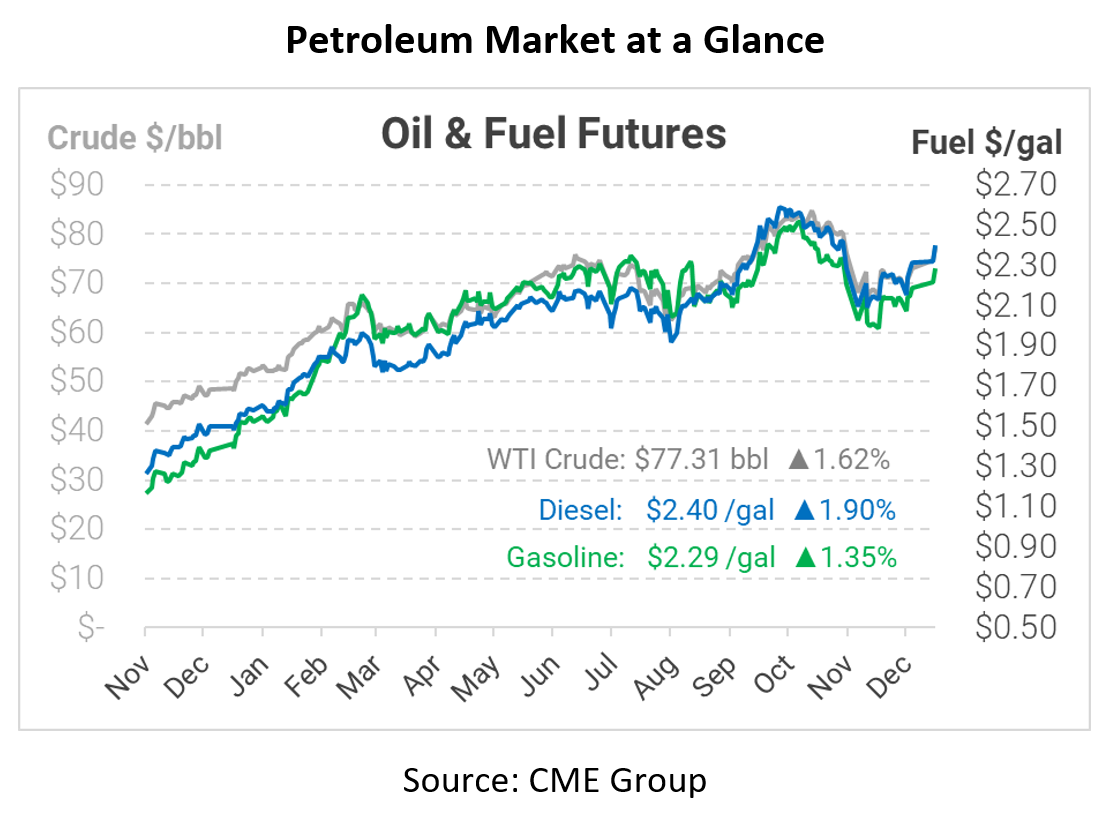
The DEF Shortage – As Prices Rise, Supply Challenges Continue
Diesel exhaust fluid is a critical component of every fuel program. Required since 2010 for on-road fleets and since 2015 for off-road fleets, most modern fleets require DEF to remain mobile. Yet a severe, worldwide shortage has spurred severe supply chain challenges. Back in September, FUELSNews sounded the alarm in “DEF Prices Explode”, explaining rising costs. Since then, the supply chain has only gotten worse.
Click Here to Learn About Mansfield’s DEF Program
Last September, urea prices were trading at $600/ton. Prices continued climbing through the year to just shy of $800/ton in December – 3x higher than normal rates. Keep in mind that urea is the main ingredient in DEF (the only other ingredient being deionized water). What’s causing the escalating prices? As the New York Times covered recently:
- European Natural Gas – The US receives roughly 10% of its DEF supply from Europe. Skyrocketing natural gas prices in the EU have driven up manufacturing costs, significantly increasing the cost of DEF.
- Chinese and Russian Restrictions – China, a key supplier of urea, has restricted exports to curb domestic shortages. Russia has also cut its exports. This has created major shortages in countries like Australia and South Korea.
- Fertilizer Competition – In addition to DEF, urea is also a key ingredient in fertilizers. Rising fertilizer costs have driven urea supply to agricultural purposes, leaving less for transportation.
Across the board, major DEF manufacturers are struggling to maintain supplies. Most of the major manufacturers have changed annual contracts to monthly spot-priced allocations. Many are reducing their DEF output to increase fertilizer production. Others expect regional outages throughout the year due to labor shortages and supply gaps. Price hikes have been commonplace, and one national DEF distributor was forced to declare force majeure in some regions over the holidays.
In addition to rising DEF prices, logistics challenges have become commonplace. Because the DEF industry is far newer than the fuel industry, there is not as much redundancy among freight capacity. While there are thousands of fuel distributors across the US and Canada, only a handful distribute DEF. A few sick drivers, delayed truck maintenance, a supply point outage – any number of factors can severely hamper supply in a region.
While DEF markets will likely remain constrained for most of 2022, there are some things you can do to stay in control.
- Increase Storage Capacity. With logistics challenges causing issues, having more supply at your site can reduce supply chain strain and provide more time between replenishments. Plus, larger storage can reduce your cost per gallon, providing an ROI that will continue after the shortage.
- Share Demand Requirements with Your DEF Supplier. Stay in close contact with your DEF supplier on any changes in demand requirements. If you know you’ll use more DEF during a busy holiday week or at the end of the month, share that so you can stay aligned.
- Maintain Redundant Supply. When all else fails, having extra jugs of DEF on hand can keep your fleet running smoothly. To prevent business risk, it’s smart to order a pallet of DEF jugs to give drivers who can’t find supply over the road.
This article is part of Daily Market News & Insights
MARKET CONDITION REPORT - DISCLAIMER
The information contained herein is derived from sources believed to be reliable; however, this information is not guaranteed as to its accuracy or completeness. Furthermore, no responsibility is assumed for use of this material and no express or implied warranties or guarantees are made. This material and any view or comment expressed herein are provided for informational purposes only and should not be construed in any way as an inducement or recommendation to buy or sell products, commodity futures or options contracts.






